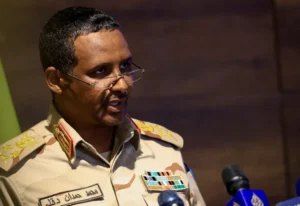
General Abdel Fattah al-Burhan, head of Sudan’s armed forces, has reaffirmed that the army will be placed under a new civilian-led government as discussions on military reforms started on Sunday as part of a protracted transition to civilian control.
A career soldier during the three decades of former President Omar al-Bashir’s rule, al-Burhan said in a speech to soldiers on Sunday, “The armed forces have supported dictatorial governments throughout our history, and we want to put an end to that.”
After al-Bashir was overthrown in 2019 and al-Burhan came to control, a shaky democratic transition was halted.
A agreement between the military and political parties in December called for the establishment of a transitional administration headed by civilians to supervise elections in two years. Pro-democracy protest groups, however, were against the agreement and demanded that transitional justice and security changes be added.
In talks about the political process that were started in December, where it is proposed that generals leave politics once a civilian government is in place, reform of the security forces is a major source of contention.
According to al-Burhan, “the process of security and military reform is a long and difficult process and one that cannot be bypassed.”
The powerful paramilitary Rapid Support Forces (RSF), commanded by al-Burhan’s deputy Mohamed Hamdan Dagalo, also known as Hemeti, would be incorporated into the regular army as part of the planned reforms.
The Sudanese army has a lengthy history of carrying out military coups and has accumulated sizable financial holdings. It desires the integration of the RSF under its authority, which some sources estimate to have up to 100,000 fighters.
The Popular Defence Forces, a government-backed militia also known as the Janjaweed, which longstanding autocratic ruler al-Bashir unleashed a decade earlier in western Darfur against non-Arab rebels and was later charged with war crimes by rights organizations, gave birth to RSF in 2013.
Experts have noted unsettling rivalries between al-Burhan and Dagalo, but on Sunday in Khartoum, the two men alternated speaking and pleaded for a smooth integration.
Al-Burhan declared that his nation would establish an armed force that the Sudanese people could rely on to establish a modern, democratic state without interfering in political affairs.
The October 2021 coup that installed al-Burhan as president, according to Dagalo, “failed” because it did not usher in change but rather the restoration of the “old regime” of supporters of al-Bashir.
The main requests of the civilian organisations that assisted in the overthrow of al-Bashir four years ago and coexisted with the military until the coup in 2021 include integrating the RSF and bringing the military under civilian control.
The December agreement followed almost weekly demonstrations since al-Burhan’s takeover in October 2021, which also led to aid cutbacks from abroad and Western sanctions, aggravating the political and economic problems in one of the world’s poorest nations.
A violent crackdown on the protests against the military and economic problems was met with the arrest of hundreds of demonstrators under emergency laws.
On April 6, the military and civilian leaders are anticipated to officially approve the agreement, and on April 11, a new civilian government will be inaugurated.
The agreement had left open for further debate a number of delicate topics, including security reforms and transitional justice.




